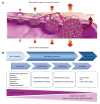New trends in molecular and cellular biomarker discovery for colorectal cancer
- PMID: 27433083
- PMCID: PMC4932205
- DOI: 10.3748/wjg.v22.i25.5678
New trends in molecular and cellular biomarker discovery for colorectal cancer
Abstract
Colorectal cancer (CRC) is the third leading cause of cancer death worldwide, which is consequence of multistep tumorigenesis of several genetic and epigenetic events. Since CRC is mostly asymptomatic until it progresses to advanced stages, the early detection using effective screening approaches, selection of appropriate therapeutic strategies and efficient follow-up programs are essential to reduce CRC mortalities. Biomarker discovery for CRC based on the personalized genotype and clinical information could facilitate the classification of patients with certain types and stages of cancer to tailor preventive and therapeutic approaches. These cancer-related biomarkers should be highly sensitive and specific in a wide range of specimen(s) (including tumor tissues, patients' fluids or stool). Reliable biomarkers which enable the early detection of CRC, can improve early diagnosis, prognosis, treatment response prediction, and recurrence risk. Advances in our understanding of the natural history of CRC have led to the development of different CRC associated molecular and cellular biomarkers. This review highlights the new trends and approaches in CRC biomarker discovery, which could be potentially used for early diagnosis, development of new therapeutic approaches and follow-up of patients.
Keywords: Biomarkers; Cancer diagnosis; Cancer therapy; Colorectal cancer; Predictive marker; Prognostic marker.
Figures




Similar articles
-
Colorectal Cancer: Genetics is Changing Everything.Gastroenterol Clin North Am. 2016 Sep;45(3):459-76. doi: 10.1016/j.gtc.2016.04.005. Gastroenterol Clin North Am. 2016. PMID: 27546843 Review.
-
Molecular biomarkers for an early diagnosis, effective treatment and prognosis of colorectal cancer: Current updates.Exp Mol Pathol. 2017 Jun;102(3):475-483. doi: 10.1016/j.yexmp.2017.05.005. Epub 2017 May 12. Exp Mol Pathol. 2017. PMID: 28506769 Review.
-
Genetic heterogeneity in synchronous colorectal cancers impacts genotyping approaches and therapeutic strategies.Genes Chromosomes Cancer. 2016 Mar;55(3):268-77. doi: 10.1002/gcc.22330. Epub 2015 Dec 9. Genes Chromosomes Cancer. 2016. PMID: 26650777
-
A gene marker panel covering the Wnt and the Ras-Raf-MEK-MAPK signalling pathways allows to detect gene mutations in 80% of early (UICC I) colon cancer stages in humans.Cancer Epidemiol. 2009 Aug;33(2):123-9. doi: 10.1016/j.canep.2009.05.001. Epub 2009 Jun 10. Cancer Epidemiol. 2009. PMID: 19679059
-
Molecular Testing for the Treatment of Advanced Colorectal Cancer: An Overview.Methods Mol Biol. 2018;1765:281-297. doi: 10.1007/978-1-4939-7765-9_18. Methods Mol Biol. 2018. PMID: 29589315 Review.
Cited by
-
Molecular modulation of autophagy: New venture to target resistant cancer stem cells.World J Stem Cells. 2020 May 26;12(5):303-322. doi: 10.4252/wjsc.v12.i5.303. World J Stem Cells. 2020. PMID: 32547680 Free PMC article. Review.
-
Colorectal Cancer in Inflammatory Bowel Disease.Clin Colon Rectal Surg. 2020 Sep;33(5):305-317. doi: 10.1055/s-0040-1713748. Epub 2020 Jun 30. Clin Colon Rectal Surg. 2020. PMID: 32968366 Free PMC article. Review.
-
Targeted Next-Generation Sequencing-Based Multiple Gene Mutation Profiling of Patients with Rectal Adenocarcinoma Receiving or Not Receiving Neoadjuvant Chemoradiotherapy.Int J Mol Sci. 2022 Sep 8;23(18):10353. doi: 10.3390/ijms231810353. Int J Mol Sci. 2022. PMID: 36142267 Free PMC article.
-
Polarimetric biomarkers of peri-tumoral stroma can correlate with 5-year survival in patients with left-sided colorectal cancer.Sci Rep. 2022 Jul 25;12(1):12652. doi: 10.1038/s41598-022-16178-3. Sci Rep. 2022. PMID: 35879367 Free PMC article.
-
Epigenetic regulation of autophagy: A key modification in cancer cells and cancer stem cells.World J Stem Cells. 2021 Jun 26;13(6):542-567. doi: 10.4252/wjsc.v13.i6.542. World J Stem Cells. 2021. PMID: 34249227 Free PMC article. Review.
References
-
- Koretz RL. Malignant polyps: are they sheep in wolves’ clothing? Ann Intern Med. 1993;118:63–68. - PubMed
-
- González-González M, Garcia JG, Montero JA, Fernandez LM, Bengoechea O, Muñez OB, Orfao A, Sayagues JM, Fuentes M. Genomics and proteomics approaches for biomarker discovery in sporadic colorectal cancer with metastasis. Cancer Genomics Proteomics. 2013;10:19–25. - PubMed
-
- Böckelman C, Engelmann BE, Kaprio T, Hansen TF, Glimelius B. Risk of recurrence in patients with colon cancer stage II and III: a systematic review and meta-analysis of recent literature. Acta Oncol. 2015;54:5–16. - PubMed
Publication types
MeSH terms
Substances
LinkOut - more resources
Full Text Sources
Other Literature Sources
Medical
Research Materials
Miscellaneous

